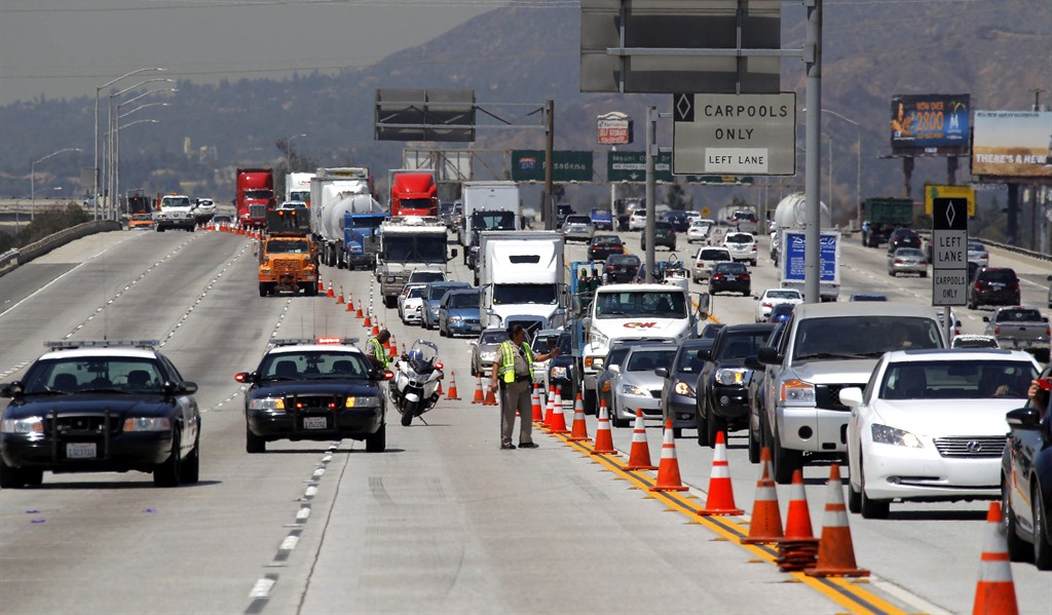If you don’t like the NSA collecting and monitoring all your communications,  you probably won’t be thrilled about new technologies that will give government power to monitor where you drive and control how you drive.
you probably won’t be thrilled about new technologies that will give government power to monitor where you drive and control how you drive.
Let’s look at a couple of options and then ponder which is more offensive.
We’ll start with government monitoring of where you drive. Here’s part of what Holman Jenkins wrote for the Wall Street Journal.
…the real threat to our autonomy gathers speed. “Autonomous” vehicles are part of the threat—because they won’t be autonomous at all. This column has warned for years about plate-recognition cameras, increasingly armed with face-recognition capabilities, that will make it impossible to go anywhere or do anything in public without being monitored. …The population is aging. An older, more timid society is likely to be in favor of penning up fellow citizens in a mesh of monitoring to regulate routine behavior. The authoritarianism of the weak, always a problem in society, will find an ally in the bureaucracy’s craving for resources.
Holman cites a few examples.
Traffic cameras…overwhelmingly ring up drivers for offenses that wouldn’t trouble a cop. New Jersey is just the latest state scandalized by discovery that yellow lights are set below the state minimum in order to yield more red-light camera tickets. …In some future discrimination or hate-crime lawsuit, will vehicle records be called up to show you locked your doors in a minority neighborhood but not in a white neighborhood? Will the state decide to raise your ObamaCare copays because a face-recognition camera also recognized a cigarette dangling from your lip? When our every action in space and cyberspace can be monitored and policed, we no longer police ourselves to any meaningful extent. We become not citizens but children. The state is our parent. The real threat is that many of our fellow citizens will like it this way.
Recommended
This sounds very Orwellian and very bad, but there are other ways for government to make driving an unpleasant experience.
Let’s see what the UK-based Daily Mail is reporting about an obnoxious European proposal to give government control over your gas pedal.
Drivers face having their cars fitted with devices that slam on the brakes if they go over the speed limit, under draconian new road safety measures being drawn up by officials in Brussels. All new cars would have to include camera systems that ‘read’ the limits displayed on road signs and automatically apply the brakes. And vehicles already on the road could even be sent back to garages to be fitted with the ‘Big Brother’ technology… The EC’s Mobility and Transport Department hopes to roll out the ‘Intelligent Speed Adaptation’ technology (ISA) as part of a new road safety programme.
And how will this big-brother system work?
The ISA technology works in one of two ways – either through satellites, which communicate limits automatically to cars from databases, or by using cameras to read road signs. It then deploys one of three controls to slow drivers: ‘advice’, in which the motorist is simply notified of the speed limit by an alarm, giving them the opportunity to slow down; ‘driver select’, which arrests the car’s speed but gives the driver the option of disabling the device; or ‘mandatory’, which would not let a driver breach the speed limit under any circumstances. …A spokesman for the AA said at lower speeds the new technology could actually create dangers. He said: ‘If you were overtaking a tractor and suddenly needed to accelerate to avoid a head-on collision, you would not be able to.’
I’m glad people from the Automobile Association are warning that the system poses risks, but opposition should be based on more than utilitarian arguments. How about the freedom to be left alone and not monitored and pestered while you travel?
But let’s set that issue aside and contemplate whether it’s worse to have the government track where you drive or worse to have the government control how you drive.
Maybe this makes me a bad libertarian, but I’m not overly worried about the first option. Perhaps this is because I have a relatively staid life. I drive to work and I drive to softball. Every so often, I drive to the grocery store or to an airport. The bureaucrats tracking me would go crazy with boredom. Heck, I’d probably feel some pressure to spice up my social life simply because I’d feel sympathy for them.
Maybe they’ll force us to drive green cars?
By contrast, I would be very irritated if the government got control over my accelerator. It’s already annoying that revenue-hungry local governments and anti-automobile greenies conspire to set speed limits considerably below safe and efficient levels. But at least there’s very little risk if you drive within 10 miles of the limit and you always have the choice to drive even faster if you’re willing to take a chance that some random cop will pull you over. But if the government imposes some system that forces my car to stay within the speed limit, I won’t be a happy camper.
I’ll be very curious to read the comments for this post. In the meantime, I’m going to close with a few optimistic words.
Simply stated, government may have the technology to spy on us, but that doesn’t mean they have the brains, ability, or manpower to make much use of this power.
Money laundering laws are a good example. It’s rather offensive that the government has set up a system that forces banks and other financial institutions to spy on all of our financial transactions.
But other than imposing high costs on the financial sector, this system doesn’t have much impact on the average person. To be sure, some poor people lose access to the financial system. And, yes, there are horror stories about people who have their accounts frozen because they’ve engaged in an unusual transaction, but most of us will live our lives without ever noticing that the government has created this Orwellian regime.
Likewise, I don’t think the monitoring and collection of traffic data will impact our lives. At least not until the point the government uses its power in some of the ways described by Holman Jenkins. But I don’t think that’s going to happen anytime soon.
I’m also somewhat hopeful that car-control technologies won’t get abused. At least not right away. Local governments, for instance, would probably oppose a system to control travel speeds for the simple reason that they want to maintain the revenue from speeding tickets.
Moreover, I bet many Americans would rise up in revolt if the government tried to take control of our gas pedals. Politicians who pushed for such a scheme would lose election and bureaucrats who tried to impose such a system via regulation would get slapped down.
We’ve lost some of our freedoms and fighting spirit, but there are some lines the government still can’t cross. Driving faster than the government allows is as American as apple pie.
P.S. Speaking of American traditions, what about the young (and not-so-young) people who sometimes do a bit of romancing while in their cars? Maybe the bureaucrats (motivated by this Obama-NSA joke) will insist that we also install internal cameras in our vehicles.


























Join the conversation as a VIP Member